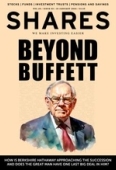Archived article
Please note that tax, investment, pension and ISA rules can change and the information and any views contained in this article may now be inaccurate.
Bitcoin excitement builds again but it is not a credible store of value

Bitcoin is having another moment in the sun on the back of the decision by the US SEC (Securities and Exchange Commission) to greenlight exchange-traded funds which track the cryptocurrency.
There is no doubting the significance of this move. It will make it easier and potentially cheaper for investors, though crucially only those across the Atlantic for now (of which more later), to invest. Mainstream asset managers like BlackRock and Fidelity are getting involved.
The SEC was at pains to dismiss any sense it was endorsing Bitcoin with this move but this is likely to be ignored. There is no doubt this a further step towards the mainstream for crypto.
Bradley Duke, chief strategy officer at exchange-traded product provider ETC Group commented: ‘The approval of the US spot Bitcoin ETFs by the SEC and also the Hong Kong Securities Commission announcement that it too will approve spot Bitcoin ETFs, goes far to legitimise Bitcoin as an investable global asset.
‘Here in Europe, we have had secure and efficient spot Bitcoin ETPs for over three-and-a-half years and we are spoiled for choice with the range of physically backed Crypto ETPs available including many different single-asset Crypto ETPs as well as broad market index products.’
Duke draws an important distinction here: current Bitcoin instruments in Europe are exchange-traded products as opposed to exchange-traded funds. This, without getting too much into the weeds, is an important distinction. ETFs in Europe have to meet diversification criteria and if that’s not possible then ETPs are the obvious solution.
ETC Group launched BTCetc - Bitcoin ETP back in June 2020, which is now Europe’s largest physically backed Bitcoin ETP and trades on several European exchanges. In 2021, the Financial Conduct Authority banned the sale of exchange-traded products containing ‘unregulated transferable cryptoassets’, arguing they had no inherent value, were widely volatile, rife with financial crime and did not fulfil any kind of planning need for investors. Interestingly, Vanguard has banned US investors using its platform from buying Bitcoin ETFs.
Bitcoin is a divisive topic. Detractors, and there are plenty of them, will line up to denounce it as a Ponzi scheme while fans argue it will revolutionise the world of money.
This author has more sympathy, though not much, for the latter argument than the suggestion of Bitcoin as a store of value to rival gold. Gold is a physical asset with a long history as a safe haven and while the price can experience some volatility, ranging between current levels above $2,000 per ounce and lows below $1,700 over the last two years, Bitcoin has ranged from $16,000 to its current $42,660 over the same period.
Anything with this level of volatility cannot be sold as a credible ‘store of value’. Blockchain, the infrastructure underpinning Bitcoin, could prove more interesting in the long term. It is a verifiable electronic ledger for recording transactions and tracking assets in a business network, which could be anything from a tract of land to a key piece of intellectual property.
There are several exchange-traded funds which look to provide exposure to blockchain as a theme – the largest of which is Invesco CoinShares Global Blockchain (BCHS) with an ongoing charge of 0.65%.
Important information:
These articles are provided by Shares magazine which is published by AJ Bell Media, a part of AJ Bell. Shares is not written by AJ Bell.
Shares is provided for your general information and use and is not a personal recommendation to invest. It is not intended to be relied upon by you in making or not making any investment decisions. The investments referred to in these articles will not be suitable for all investors. If in doubt please seek appropriate independent financial advice.
Investors acting on the information in these articles do so at their own risk and AJ Bell Media and its staff do not accept liability for losses suffered by investors as a result of their investment decisions.
Issue contents
Ask Rachel
Daniel Coatsworth
Feature
- Diversification is key to the streaming service’s success in 2024 and beyond
- How fund managers plan to respond to the artificial intelligence theme in 2024
- Beyond Buffett: How is Berkshire Hathaway approaching the succession and does the great man have one last big deal in him?
- Should investors be concerned by Fundsmith Equity's five year underperformance?
Great Ideas
News
- After a dearth of IPOs last year, 2024 already looks more interesting
- Warpaint shares continue to soar after strong trading update
- Burberry shares hit a new low after second profit warning
- FCA to investigate commission deals in the UK motor finance market
- Why the outcome of a pre-trial hearing could prove good news for GSK

 magazine
magazine








